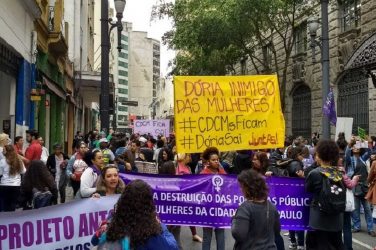Victims of slave labor in Brazil are less likely to be rescued following a government decree that changes the country’s definition of slavery and weakens the hand of inspectors, campaigners and human rights officials say.
In Brazil, forced labor has been defined as a form of modern-day slavery. This includes debt bondage, degrading work conditions, and long work hours that pose a risk to a worker’s health or life, and violate their dignity.
But campaigners said a decree just issued by Brazil’s labor ministry is a major setback in combating slave labor because it changes the circumstances under which slavery is defined, limiting it to a victim’s freedom of movement.
“Before, if a worker is sleeping with the pigs, has no water, and doesn’t receive a wage, the labor inspector says this is slave labor, even though the worker can leave the farm,” said Leonardo Sakamoto, a trustee of the U.N. Voluntary Trust Fund on Contemporary Forms of Slavery, which helps victims of slavery.
“But today with this decree, this isn’t slavery any more.”
Rights groups estimate hundreds of thousands of people work in slave-like conditions on farms, sugar cane plantations and cattle ranches across Brazil’s remote and jungle areas, as well as in urban factories and construction sites.
“The violation of (human) dignity is the main point that characterizes the Brazilian definition of slavery,” said Dominican friar Xavier Plassat, who heads the Pastoral Land Commission anti-slavery campaign.
“This isn’t only a question of the violation of freedom but of negating dignity through degrading conditions and an exhaustive work day.”
Adilson Carvalho, who heads the national commission for the eradication of slave labor at Brazil’s ministry of human rights, said it was not consulted about the changes.
“We’re very concerned about the continuity of policies to combat slave labor,” Carvalho said.
The labor ministry said in a statement that “combating slave labor is a permanent public policy of the state.”
Labor Inspectors
Brazil has about 2,000 labor inspectors who raid locations where slave labor is suspected, and more than 50,000 victims of forced labor have been freed in the past two decades.
The International labor Organization (ILO) said on Thursday the new government decree “runs the risk of interrupting” the progress made by Brazil on fighting slave labor.
Under the new decree, labor inspectors will now be required to include a police report as evidence.
Renato Bignami, an inspector with the ministry of labor, said the new rules heralded “extremely negative” changes.
Federal and labor prosecutors have issued a joint recommendation to the government, saying the decree is illegal. They said if the government does not revoke the measure, prosecutors would mount a legal challenge.
Legal uncertainty surrounding the new rules has led labor inspectors to postpone inspections in about a dozen of Brazil’s 26 states, Sakamoto said.
Campaigners say changes to Brazil’s anti-slavery law are politically motivated ahead of a vote – expected within days – over the fate of President Michel Temer.
Temer faces a vote in the lower house of Congress on whether to allow a trial against him on charges of obstruction of justice and organized crime in relation to a corruption case.
Campaigners suspect bargaining with powerful agricultural lobbyists and landowners, along with interested lawmakers.
“This new decree is directly involved with Temer’s efforts to save his neck from the guillotine. The changes were issued at the moment when Temer needs their votes,” Sakamoto said.
This article was produced by the Thomson Reuters Foundation. Visit them at http://www.thisisplace.org














